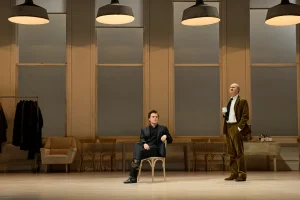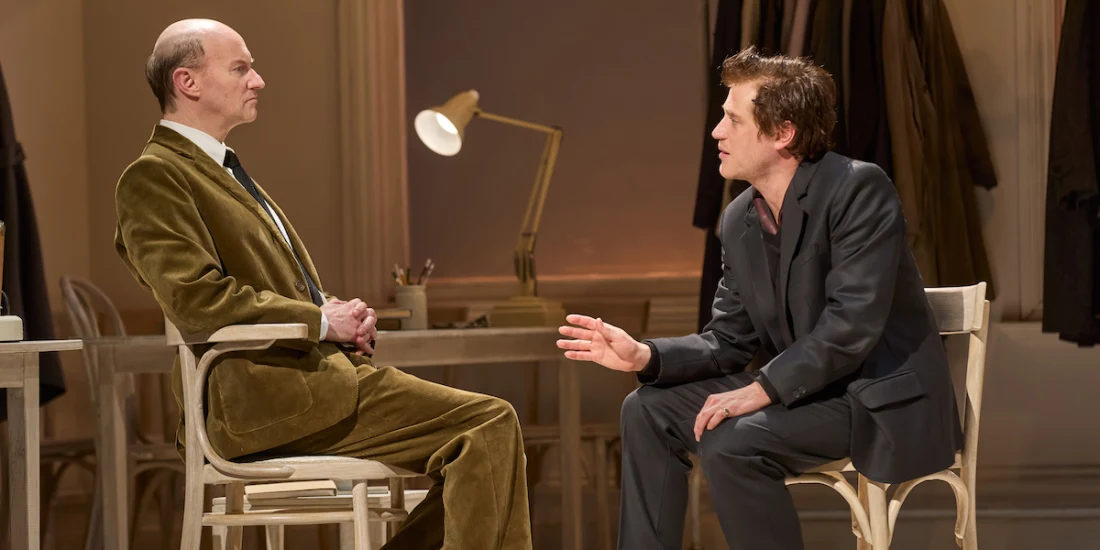
'The Motive and the Cue' review – a deliciously entertaining account of the famous Burton/Gielgud 'Hamlet'
Read our four-star review of The Motive and the Cue starring Johnny Flynn and Mark Gatiss at the National Theatre, with performances currently through 15 July.
Hamlet urged his players to hold a mirror up to nature; Jack Thorne, in his witty telling of the famous 1964 Burton/Gielgud production of Shakespeare’s tragedy, certainly holds a mirror up to the rehearsal room. Sleekly presented by Sam Mendes, this is deliciously entertaining backstage drama, full of gossipy details, ego-clashing, and, at its best, rich humanising of titanic figures.
Those include a 60-year-old Sir John Gielgud, here representing theatrical tradition, at a loose end in a career that peaked early with his own Hamlet aged just 25. He agrees to direct a new Broadway version of the play with a radical framing: it will have the aesthetic of a final rehearsal, with the actors in casual modern dress. Less Elsinore pageantry, more Angry Young Prince.
Most importantly in commercial terms, it will be led by the 38-year-old Richard Burton, whose celebrity has just skyrocketed following his (first) marriage to Elizabeth Taylor, but who has squandered his talent on mediocre films. Can Gielgud guide the wayward, paparazzi-hounded Hollywood star into a great classical performance, and can Burton help Gielgud to remain relevant during a time of theatrical revolution?
That dynamic plays out in a series of increasingly fraught (and, for us, hilarious) rehearsals, in which Burton demands more direction from Gielgud, then responds with volcanic fury when given a note — especially line readings, which he interprets as Gielgud trying to graft the director’s own version of Hamlet onto him. Burton is wrestling with a combination of pride and deep-rooted insecurity; at heart, he doesn’t believe he’s the right casting for Hamlet.
Ironically, musician and actor Johnny Flynn is also counterintuitive casting for Burton. He doesn’t have his imposing physique or profoundly melodious baritone; the much slighter Flynn is working with a piping tenor. He has a good crack at the Port Talbot accent and vocal fireworks, but it can feel comically exaggerated — at times it reminded me of Michael Sheen giving his stirring speech to the Welsh football team.
Or is that partly deliberate? He has to act as Burton initially acting badly, a tricky layered challenge. But we don’t get a strong enough sense of Burton the miner’s son, as handy with his fists as with a soliloquy, already too drink-dependent, and with a dangerous sexual magnetism; he’s clearly seduced his Ophelia. Flynn does sensitively handle Burton’s moments of self-doubt and vulnerability, as Thorne digs into his daddy issues (in a too-neat piece of cod psychology) in order to unlock his Hamlet.
But this is Mark Gatiss’s show: he has never been better than he is here with a pitch-perfect Gielgud. Granted, he gets the best lines, from luvvie bon mots to brilliantly devastating bone-dry putdowns.
In trying to get Burton to stop shouting, he quips “Those hunting calls you do so well can become tiresome”, and, nailing the problem with his too-decisive Hamlet, notes that instead of the prince’s vacillating, he has no doubt that Burton’s “would kill [Claudius] immediately.”
But he also provides a fascinating, textured portrait of a blazing talent reckoning with obsolescence in the one place he felt accepted. That’s lent extra poignancy in a brief but vital scene where the homosexual Gielgud confides in a male sex worker — and it makes a drunken Burton’s mocking impression of Gielgud, with “old-fashioned sing-song delivery” and nastily camp flourishes, seem particularly cruel.
Tuppence Middleton is excellent in a flattering depiction of Elizabeth Taylor; rather than diva, attention-seeking antics, Thorne makes her a shrewd, behind-the-scenes peacemaker (albeit one who is highly aware of her own sexual power).
It’s Taylor who explains to Gielgud how the working-class Burton has mythologised his own story, and that of course he wouldn’t have a natural grasp of the diffidence of a privileged character like Hamlet.
There are strong turns, too, from the cast-within-the-cast: Luke Norris as a petulant American actor who wants his Guildenstern to be more significant; Janie Dee as a dignified Eileen Herlie, icily disdainful of Burton’s behaviour; and Allan Corduner as a wryly philosophical Hume Cronyn.
I wish we could have seen more from them all (and Middleton, too), and perhaps less of Gielgud’s young assistant, who is only there to helpfully voice views in opposition to his: she wants to direct modern plays, man, not stuffy Shakespeare.
Es Devlin’s achingly stylish design sees sliding panels opening up to reveal the monochromatic rehearsal room. It also contrasts our main players: a polo neck-sporting Burton and silk negligée-clad Taylor in luxurious surroundings, bathed in hot pink or fiery red (wonderful lighting by Jon Clark); a cool-blue-tinted, corduroy and tie-wearing Gatiss in austere digs, eating sandwiches from wax paper wrapping.
Thorne’s play might have too much theatrical in-joking and navel-gazing for some, with its discussions of whether the creative process matters as much as the product, whether clues to a character lie within the text versus talk of motivation and The Method (the show’s title is a Hamlet quote about the reason to do something versus the passion to spur you on), and constant references to “Larry” (aka Laurence Olivier) — the ghost stalking both Gielgud and Burton.
But the genuine love for the medium is incredibly touching (there’s no other art form, proclaims Gielgud, “where minds meet so beautifully”), and Thorne cleverly balances that with affectionate lampooning and occasional sharp skewering.
In fact, there’s fun to be had in wondering whether he and Mendes had anyone else in mind with some of their rehearsal room bad behaviour — but perhaps that’s a whole other play.
The Motive and the Cue is at the National Theatre through 15 July.
Photo credit: Mark Gatiss and Johnny Flynn in The Motive and the Cue at the National Theatre (Photo by Mark Douet)
Frequently asked questions
What is The Motive and the Cue about?
Mark Gatiss and Johnny Flynn take the stage in the National Theatre's West End transfer of The Motive and the Cue. Academy Award-winner Sam Mendes directs this hilarious new play that delves into the making of Richard Burton and John Gielgud's Hamlet on Broadway. Find out more about tickets on London Theatre.
How long is The Motive and the Cue ?
The running time of The Motive and the Cue is 2h 40m (incl. interval)
Where is The Motive and the Cue playing?
The Motive and the Cue is playing at Noël Coward Theatre. The theatre is located at 85-88 St Martin's Lane, London, WC2N 4AU.
What's the age requirement for The Motive and the Cue ?
The recommended age for The Motive and the Cue is 12+ Everyone, regardless of age, must have their own ticket to enter the theatre. Children under the age of 16 must be accompanied by and sat next to a ticket holder who is at least 18 years old. Children under the age of 5 will not be admitted. .
How do you book tickets for The Motive and the Cue ?
Book tickets for The Motive and the Cue on London Theatre.
Originally published on
